The afternoon session on Monday focused on several interrelated topics, starting with a talk by Alex Iskold on "Structured Attention." I caught the beginning part of this one, then had to jump over to a concurrent session. Alex said there are three types of recommendation engines: personal, social (collaborative filtering), and genetic (like Pandora). 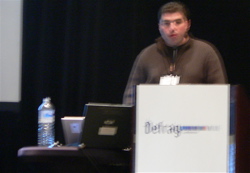 "But the problem is they’re silos," said Alex, "and we don’t own them." Thus, the gist of Alex’s treatise it that we need "Web Wide Attention." The way it stands now, "No single site knows all about me." He said that has to change.
"But the problem is they’re silos," said Alex, "and we don’t own them." Thus, the gist of Alex’s treatise it that we need "Web Wide Attention." The way it stands now, "No single site knows all about me." He said that has to change.
The other breakout session I then joined was one by Peter Semmelhack, founder of Bug Labs. This was a session billed as "Defragging Gadgets: Community-Driven Electronics." But Peter titled his talk "Hardware Innovation 2.0" — positing "what if we made all technologies available in Lego-like fashion?" 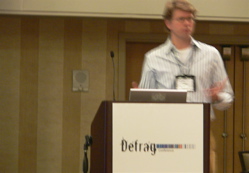
His startup company is developing an open platform for physical devices, and 81 snap-together modules, along with web-services based interfaces, resulting in three million combinations. Peter spoke of The Long Tail of Gadgets, which he described as "millions of devices for the few instead of a few devices for the millions."
Thus, his company is talking about niche, customized devices, to meet the application needs of narrow markets (even individuals). He even went to far as to suggest that this concept will disrupt the consumer electronics business, calling it "the age of personal electronics." 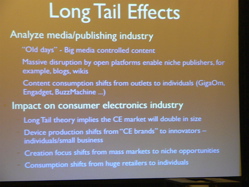 He said later, however, that Bugs Labs’ target audience is only early adopters (and, I would say, only the geeky ones), "by no means mass consumer." Thus, I fail to see how it would really disrupt an entire industry. And no one asked about where product design fits into the equation, once he showed us how the modules snap together, appearing rather kludgey. (He showed CPU, digital camera, LCD, and GPS modules, for example.) It is nonetheless an interesting concept, and Peter did say his firm is seeing a niche market for firms that are now locked into proprietary platforms and have a need to quickly and easily convert to an open platform. He also said they’re seeing interest in the area of home automation.
He said later, however, that Bugs Labs’ target audience is only early adopters (and, I would say, only the geeky ones), "by no means mass consumer." Thus, I fail to see how it would really disrupt an entire industry. And no one asked about where product design fits into the equation, once he showed us how the modules snap together, appearing rather kludgey. (He showed CPU, digital camera, LCD, and GPS modules, for example.) It is nonetheless an interesting concept, and Peter did say his firm is seeing a niche market for firms that are now locked into proprietary platforms and have a need to quickly and easily convert to an open platform. He also said they’re seeing interest in the area of home automation.
Esther Dyson took the stage next for a brief discussion on Attention. The problem of data privacy is a huge one, she said. There’s data being misused for criminal reasons, but also many other semi-legitimate uses, which may not be criminal, but are still very bothersome. "Consumers really have no idea what’s going on," Esther said. "No one reads disclosure statements." 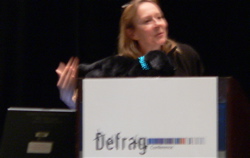
She also commented on the strange dichotomy that advertisers can deliver such personalized messages to you, but "why can’t they deliver your personalized data to you, as consumers?" She also commented on how consumers have changed: "Facebook and other scoial networks have changed the ambient notion of what a ‘profile’ is. We’re beginning to understand ‘selective disclosure’ — and even moreso if you’re younger." Esther also put forth the intersting notion that Facebook is "advancing narcissism — which isn’t really making advertising any better — people will enhance their profiles to get better treatment from advertisers." She closed by saying that "Consumers want to be able to be selective with letting out their data, but they don’t know how." But, as consumers, she said "You can demand things. You have the power to demand metadata that is meaningful."
Another great talk at the end of the afternoon was by Doc Searls, on the subject of "Vendor Relationship Management." This is all about "customer reach" rather than "vendor grasp," he said. "Why can’t you create your own profile data just once?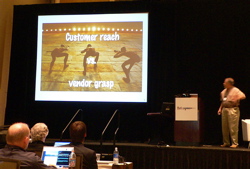 Why is the free market still ‘your choice of silo’?" Doc’s assessment is that the Industrial Age hasn’t ended yet. "And things won’t change till companies stop wanting dependent customers instead of independent ones." He pointed how ridiculous, for example, the customer agreement of Verizon is, which is some 10,000 words. "All this to basically say you have approximately no rights at all." [Love the way with words Doc has.] "In real markets," Doc said,"customers do more than just consume. What if we could help vendors instead of just carp about them? We need to manage our preferences across whole markets." He then went on to describe his Project VRM (for vendor relationship management), which he launched in his current role as a Fellow at Harvard’s Berkman Center for the Internet and Society.
Why is the free market still ‘your choice of silo’?" Doc’s assessment is that the Industrial Age hasn’t ended yet. "And things won’t change till companies stop wanting dependent customers instead of independent ones." He pointed how ridiculous, for example, the customer agreement of Verizon is, which is some 10,000 words. "All this to basically say you have approximately no rights at all." [Love the way with words Doc has.] "In real markets," Doc said,"customers do more than just consume. What if we could help vendors instead of just carp about them? We need to manage our preferences across whole markets." He then went on to describe his Project VRM (for vendor relationship management), which he launched in his current role as a Fellow at Harvard’s Berkman Center for the Internet and Society.
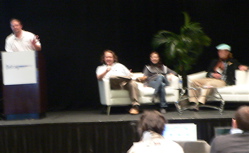
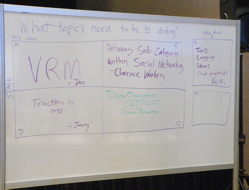
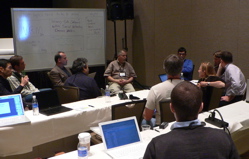
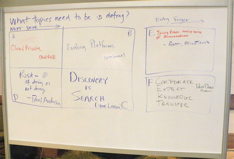
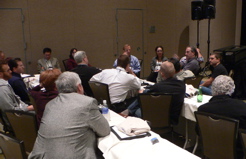
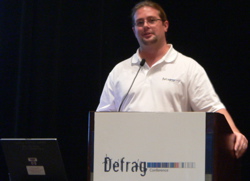
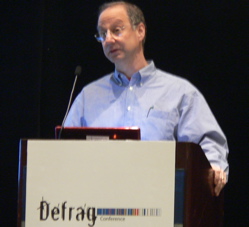

Recent Comments